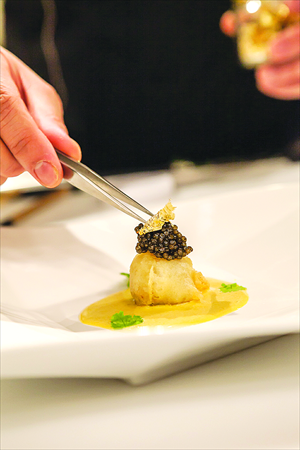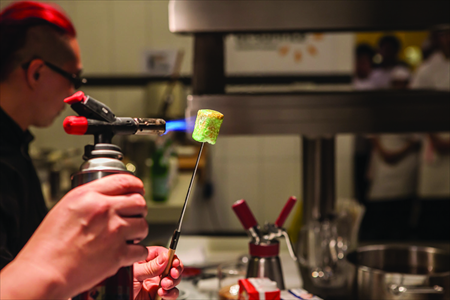Culinary crisis

Western cuisine again reigns supreme on this year's list of The World's Top 50 Restaurants. Photo: Courtesy of Asia's 50 Best Restaurants
Beijing is a cosmopolitan jewel in China's crown, buzzing with the steam and sizzle of 70,000 restaurants featuring the country's best regional cuisines. However, recent years have seen Beijing languish in the culinary cold outside rankings of the world's top restaurants.
Beijing's absence from the Michelin Guide, the world's best-known restaurant guide, is at least palatable considering that it overlooks the entire Chinese mainland. However, the city's lack of representation for the past 11 years in The World's Top 50 Restaurants, a global guide launched by British magazine Restaurant in 2002, is far more damning.
Despite Beijing being the center of China's political and cultural power, its culinary credentials are continually overshadowed by Hong Kong and Shanghai, the latter which became the first mainland city to host a restaurant included in The World's Top 50 Restaurants' 2013 list released in April.
Beijing restaurants' inability to seduce the global dining elite's taste buds has prompted some culinary soul searching. Is its local cuisine too bland? Does its dining culture fail to meet international standards? Or are its restaurateurs to blame?
Hail to the chef
Boris Yu, Shanghai-based academy chair of the China and Korea region for The World's Best 50 Restaurants awards, said votes cast by the guide's 36 panelists for the region were anonymous. He pinpoints one of the biggest differences between Beijing and Shanghai restaurants as the capital's lack of a "chef-led culture."
"A chef-led restaurant is one where the head chef is the face and voice of the restaurant. The chef defines the philosophy and inspiration behind the cuisine, the ambience and the service - the entire make-up of the restaurant," Yu told Metropolitan.
"There are more chef-led restaurants in Shanghai than Beijing. In Shanghai, it's about the chef and not the restaurants. I like Temple Restaurant Beijing. It's a very nice restaurant, but there is no chef there who represents the restaurant and there is no soul."
In the 2013 list of The World's 50 Best Restaurants, European restaurants accounted for eight of the top 10 spots. The highest ranked Asian restaurant was Tokyo's Narisawa (20), ahead of the Hong Kong Mandarin Oriental Hotel's restaurant Amber (36) and Shanghai French bistro Mr & Mrs Bund (43).
Yu noted that the guide's reputation as a fine-dining bible means it scrutinizes more than just restaurants' food, also assessing the "art and special character" of each establishment.
"Chefs must have the same character to create a special experience for you when you go to a restaurant, otherwise it would be like going to McDonald's or KFC," Yu said. "[Diners] want character at a restaurant. They want to go to a restaurant because its chef is creative, innovative and original, or he creates authentic, traditional food."
Yu also singled out Chinese culture for holding back restaurants' advancement, noting that chefs aren't respected or valued at home to the same degree as in the West.
"Chinese usually regard the chef as just another restaurant employee, but you shouldn't say that a chef 'works for a restaurant.' It should be a case of a restaurant 'reflecting the characteristics of a chef.' In traditional Chinese culture, chefs are low-level [workers]. In Western culture, they are artists," Yu said.
"The chef only cooks - that's the traditional Chinese restaurant way. The owner takes charge of the restaurant, its decoration and service. But it's a complete experience. It's like building a car; there is research and design, construction and finally delivery. When you split up production, it doesn't work anymore."



Asia's top chefs show their flair in the kitchen during a two-day workshop held in February in Singapore. Only one Chinese mainland restaurant was listed on The World's Top 50 Restaurants' 2013 list. Photos: Courtesy of Asia's 50 Best Restaurants
Learning from Shanghai
Monica Luo, director of communications at Mr & Mrs Bund, said the restaurant's acclaimed French chef, Paul Pairet, and its multisensory experience offered to diners helped seal its debut listing on The World's 50 Best Restaurants this year.
"Paul is quite well-known in Western cuisine circles. He creatively interprets classic and traditional French cuisine," Luo said. "We host French-style house parties set in the 1970s and 1980s every season. Rarely do French or other European cuisine restaurants host such events. Our unique and fun method of operation attracted media reports, which increased our visibility."
Luo said Chinese mainland restaurants have long been neglected by Eurocentric food guides, which makes it difficult to build their reputations on the global gastronomical stage. "If our restaurant was in Japan, France or elsewhere in Europe, it would have been ranked on elite restaurant lists since its first day of its opening [in 2009]. Those lists have long been dominated by European and American restaurants. The Chinese mainland is not closely observed, and always lacks exposure," said Luo.
Based on her observation of Beijing's restaurant scene and her experience of working in Shanghai for the past six years, Luo said the latter still has the edge over its northern rival.
"Shanghai has more expats. People in Shanghai are more interested in entertainment consumption, which helps the hospitality industry. The dynamic business environment and presence of expats and foreign tourists might also have won over [The World's Top 50 Restaurants] judges," she said.
Western bias in ratings
Bian Jiang, spokesman for the China Cuisine Association (CCA), claimed Chinese restaurants are overlooked by international food critics who favor Western cuisine standards.
"Chinese and Western cuisine are vastly different, from ingredients used to cooking methods. For this reason, we have our own [Chinese Restaurant Brands] evaluation system," Bian said, referring to an accolade bestowed on restaurants by the CCA.
"Chinese cuisine relies on complicated temperatures, timing and pot-cooking techniques. Western cuisine ... is less complicated in these regards."
Bian also said Chinese restaurants can't be judged fairly because overseas guides lack "corresponding standards" for Chinese cuisine.
Yu identified another reason for Beijing restaurants' poor global performance as the short domestic history of rating systems.
"If you look around the world, all these restaurant ratings systems are from the West. I think they date back to the early 20th century when the first food critics emerged in Paris. Rating Western cuisine is deeply-rooted in culinary heritage," Yu said.
Building Beijing's potential
Despite identifying numerous shortfalls with mainland restaurants, Yu said he was shocked a popular Beijing restaurant didn't rank among The World's Top 50 Restaurants' 2013 list.
"I was surprised that Li's Imperial Cuisine restaurant missed out," he said of a traditional Chinese cuisine hutong restaurant near Houhai. "Li's restaurant is probably the most 'chef-led' restaurant I observed in Beijing. Chef Li is very creative and original in terms of interpreting Beijing imperial cuisine."
Jennie Kang, marketing director at Temple Restaurant Beijing, said the venue's main focus is satisfying customers and improving food and service.
"We invite Michelin chefs to give lectures sharing their experiences. We can get inspiration from those visiting guests."
Asked about the restaurant's lack of a "chef-led culture," Kang emphasized the value of working as a team.
"Rather than singling out any one person, we believe more in the strength of the whole team. This includes all our chefs, service team members and other administration staff. Chefs are members of our whole team," she said.